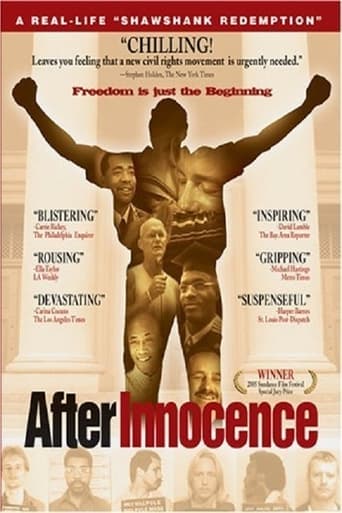A moving account of the experiences of men exonerated after years, and sometimes decades, in prison following newly found DNA evidence.


Similar titles
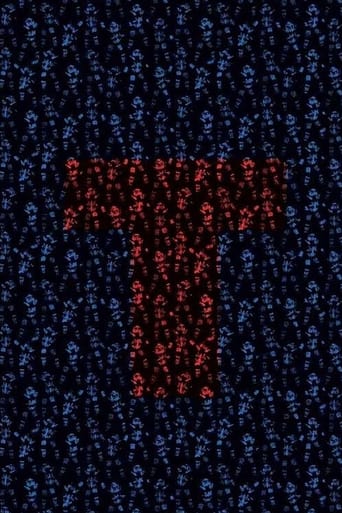
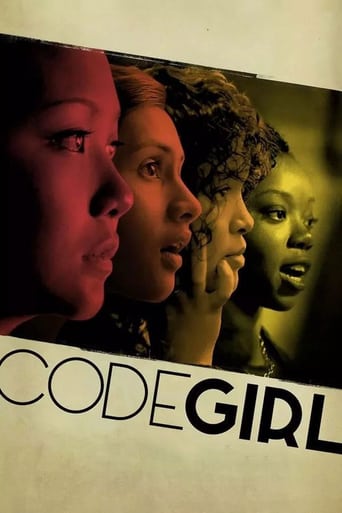
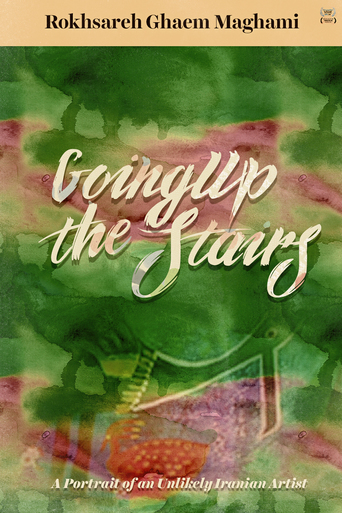
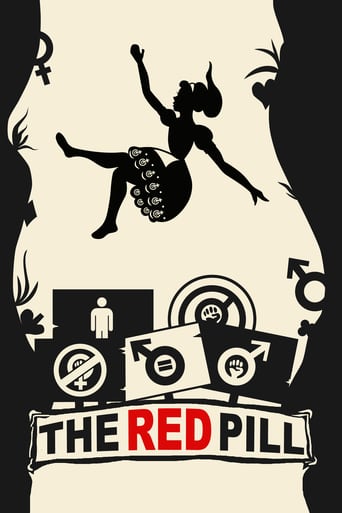
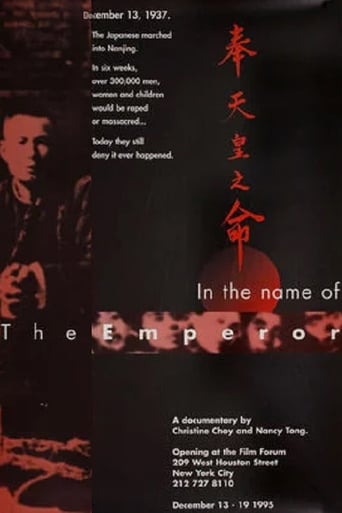
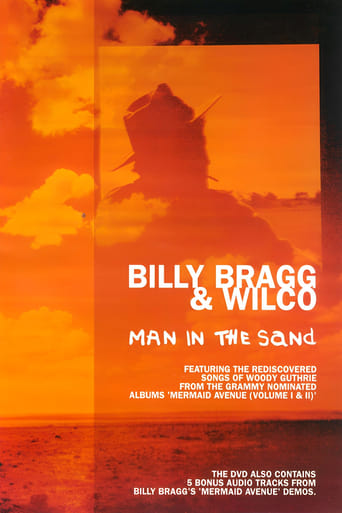


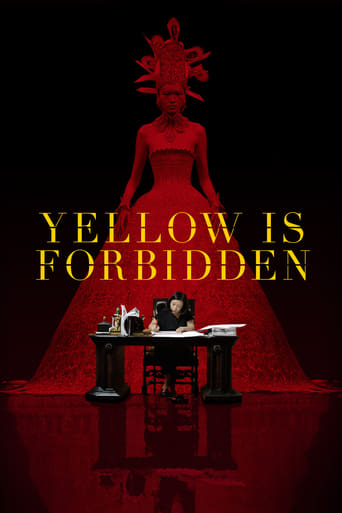

Reviews
The problem with this movie is not the subject matter, which is compelling, or the way in which the movie is presented, which is straight forward. Rather, it fails to offer a suggestions for improving what is obviously a flawed judicial system. Miscarriages of justice occur. They occur throughout history. Books have been written on this subject; it has been dramatized and discussed, e.g., The Count of Monte Christo, Judge Dredd, indeed Jesus Christ himself was crucified although found by the chief magistrate to have done nothing wrong. The judicial system is imperfect and the machinery of justice has some loose nuts and bolts which effect its operation. Most of these wrongly convicted gentlemen whose cases are discussed were found guilty based upon the evidence presented at their trials. It was the admission of additional evidence years later, after the their trials were concluded, that caused their convictions to be later reversed. That this country has an appeal system that allows the admission of new evidence after a trial is adjourned and sentence pronounced is a sign that may be the system is in fact working properly, that even years later, a court is willing to give a case a second review.
I couldn't sleep, so was watching early morning TV. This film killed sleep that night.I was crying, with anger, empathy ...and remorse, because I have never done anything to highlight such miscarriages of justice.The prosecutor in Mr Dregde's case - who could not admit he got it wrong, and made him spend 3 more years in jail. A seriously stupid and blinkered man.The lack of conscience of the state and prosecutors - who did not expunge the records, and left these people with a tragic life on the outside, worse than if they had been guilty.The one prosecutor who apologised is a man of honour.Governor Ryan is a very brave man, and one of conscience - would we had more in Government! May I recommend John Grisham's book, The Innocent Man, For another tale of criminally inadequate judiciary - I don't even like him as a writer, but I was given this book, and slept less because of it.How many people rot in jail because of incompetent prosecutors and lazy investigators? Thank God for DNA - as the film said - "God's Fingerprint".I have never written to a website before - I don't like giving details for Spam senders - but this film has made me so ANGRY!!! Can anyone support the death penalty having seen such spectacular miscarriages of justice? The people not shown,on death row,whose evidence has been "lost".The lack of expungement, and thus hurdles in getting a job.The FEE to get an expungement in some states - take my life and then charge me to get it back? Compensation for lost earnings, and for monies spent on defence, should be automatic for all exonerees - in most cases, they have lost the best years of their life, and their chance to establish themselves financially, through the incompetence of the justice system. The lawyers from the Innocence Project got it right - this should be a clarion call to all of us, to reform the system.Thank you to the filmmakers for such a coherent and impressive film - and to those who helped finance it. It should be shown weekly on national TV.0
Documentary about men who had been incarcerated, some for 20 years or more, awaiting certain execution on death row, who subsequently have been exonerated after their convictions for capital crimes were overturned as a result of new, DNA-based evidence proving their innocence.These conviction reversals are, almost without exception, the result of pro bono legal assistance provided by the Innocence Project, a non-profit legal clinic established in 1992 at the Benjamin N. Cardozo School of Law in New York City.The two founders of the clinic, Barry Scheck and Peter Neufeld, have waged a relentless battle to aid wrongly convicted men facing execution, in the process encouraging the development of similar clinics in 30 states. To date, 175 persons have been exonerated through these efforts.Former Illinois Governor George Ryan was so impressed by the likelihood of error in capital convictions that, shortly before leaving office early in 2003, he commuted the death sentences of all convicts awaiting execution in his state.This film focuses on several affected men, exploring the events and circumstances that followed the demonstration of their innocence. Exoneration brings no assistance to these men. For example, even the expungement of the conviction from the criminal justice record is not automatic. It must be applied for through a convoluted paper process. In one state, the exonerated individual must pay $6,000 in fees to gain an expungement.Whereas guilty felons placed on parole may be entitled to many services and sources of aid for things like education, employment and heath care, exonerated persons receive no such entitlements. No state has arranged a program to offer compensation to any of these people. In nearly every instance, they don't even get an apology from the State for erroneously taking away their freedom for years upon years.We also are reminded of bad things we already knew from other films, namely, that prosecutors and judges are often loath to accept the DNA evidence, insisting, if you can believe this, that because a case was tried fairly, i.e., the trial met acceptable prosecutorial and judicial standards, the convict should continue to be incarcerated and even executed, despite proof of innocence! In one man's case that we follow throughout this film, prosecutors stalled for three years after DNA testing had proved that he was not the perpetrator, during which time the man remained in prison, before Innocence Project lawyers prevailed in bringing the DNA evidence to court and winning an acquittal. Interviewed for the film, one member of that prosecuting team justified the effort to keep the convict on death row on the basis that "the victim's family needs closure." Not every case reveals such perversely twisted sentiments. In a heartwarming example of the opposite reaction, we see a prosecutor embrace another newly released, exonerated man, apologizing for the hardship caused by his false conviction and incarceration.We see in this film stories of success and failure after release of these men from prison. One gets a good job from a sympathetic truck repair shop owner. Another successfully pursues his dream of becoming a psychotherapist, first obtaining an A.A. degree, then his B.S. in Psychology. But others fail to find decent work, their records still blemished by unexpunged information regarding their false convictions. One man dies of a heart attack a few years after his release. A successful support group is formed in one locale, and we learn of various efforts now underway to seek compensation, though none has so far succeeded.Some sobering comments on the problem of false conviction are offered by Barry Scheck and others along the way. The exonerated persons represent the tip of a huge iceberg. The various Innocence Projects around the country receive hundreds and hundreds of requests for aid, far more than they can even answer, much less take on. We are shown files drawers full of unopened envelopes, letters from convicts seeking the help of Scheck and Neufeld's clinic. Scheck says that DNA analysis is possible in only about 10% of the cases they do review. In the other 90% of cases, materials on which DNA analysis can be performed were either absent, were rendered unusable because of botched evidence collection, have been destroyed or lost in the years since the trial.Scheck also tells us that eyewitness reports constitute the sole evidence base for successful prosecution in 78% of capital crime convictions among persons now on death row. This despite the fact that a huge body of psychological research, conducted by experts like Elizabeth Loftus at the University of Washington (now professor at the University of California, Irvine), has demonstrated the frequent unreliability of such evidence. One exonerated man's story, followed in this film, has, since his release, brought him into contact with the rape victim who erroneously identified him in a police lineup, the sole basis of his conviction. He and the woman that he did not rape have become friends, and they share a common goal of improving the evidence base relied upon by prosecutors.This film is extraordinary insofar as its subject - life in the community after exoneration - has not previously been explored in any depth, factual content is lucidly presented, the men featured are articulate, highly interesting individuals (almost all, for example, are remarkably free of hostility about their experiences), the talking heads are informative and kept to an essential minimum, and the photography, editing and continuity are first rate. Jessica Sanders makes her debut here as the (co)writer-director of a feature length documentary. It's a splendid beginning. My grade: 10/10
Again and again the revelations in Jessica Sanders' documentary brought audible gasps from the Hawaii International Film Festival audience. Here, in stark images and gut wrenching narrative, were the stories of men imprisoned, sometimes for 20 years and more, because of erroneous victim identification, sloppy or corrupt police work and over-zealous prosecutors. Here, in footage as raw as reality, is proof positive that much of the American judicial system is more righteous than just, and almost incapable of even saying to a guy, "I'm sorry," before dumping him on the streets, penniless."After Innocence" shows us the maddening frustration of convicts who fight to re-open their cases on the basis of DNA evidence, and then what becomes of them if and when that evidence exonerates them. It is a deeply disturbing picture. It also shows you the dedicated work of not-for-profit organizations such as The Innocence Project that are overwhelmed in their attempts to help. It is clear that there are literally thousands of wrongfully imprisoned people in America, most of them with little hope of ever being vindicated.Sanders' film focuses on seven men, including a police officer, an army sergeant and a young father, all released, plus a man in Florida still behind bars over three years after irrefutable DNA evidence cleared him of rape. Some of them had been in solitary confinement on death row, frequently for decades, for crimes they did not commit. Eight years after being exonerated, the now-graying dad has been unable to get his conviction expunged from official records, making it almost impossible for him to find meaningful, full-time employment. Despite being absolved of any involvement in the crimes for which he was imprisoned, he is still treated as an ex-con."DNA is God's signature," says one man, imprisoned for well over 20 years. "And God doesn't lie." Unfortunately, our governmental systems don't always tell the truth.Jessica Sanders was nominated for an Academy Award for her 2002 short documentary, "Sing." It was released in theaters and aired nationally on Public Television. "After Innocence" will also have a theatrical release and is scheduled to air on Showtime early in 2006. Eventually it will be released on DVD. It has the power to ignite a firestorm of protest over our failed judicial system and to be a catalyst for important change. Ms. Sanders, who sees herself as a filmmaker, not a journalist, is currently working on the screenplay for a dramatic film. When "After Innocence" was screened at the Sundance Film Festival she indicated she wants to continue to use film "as a way to give people a voice that don't necessarily have that means." She doesn't have a new documentary project in the works right now, but one can hope that she will continue to demonstrate her enormous talent in this field.
